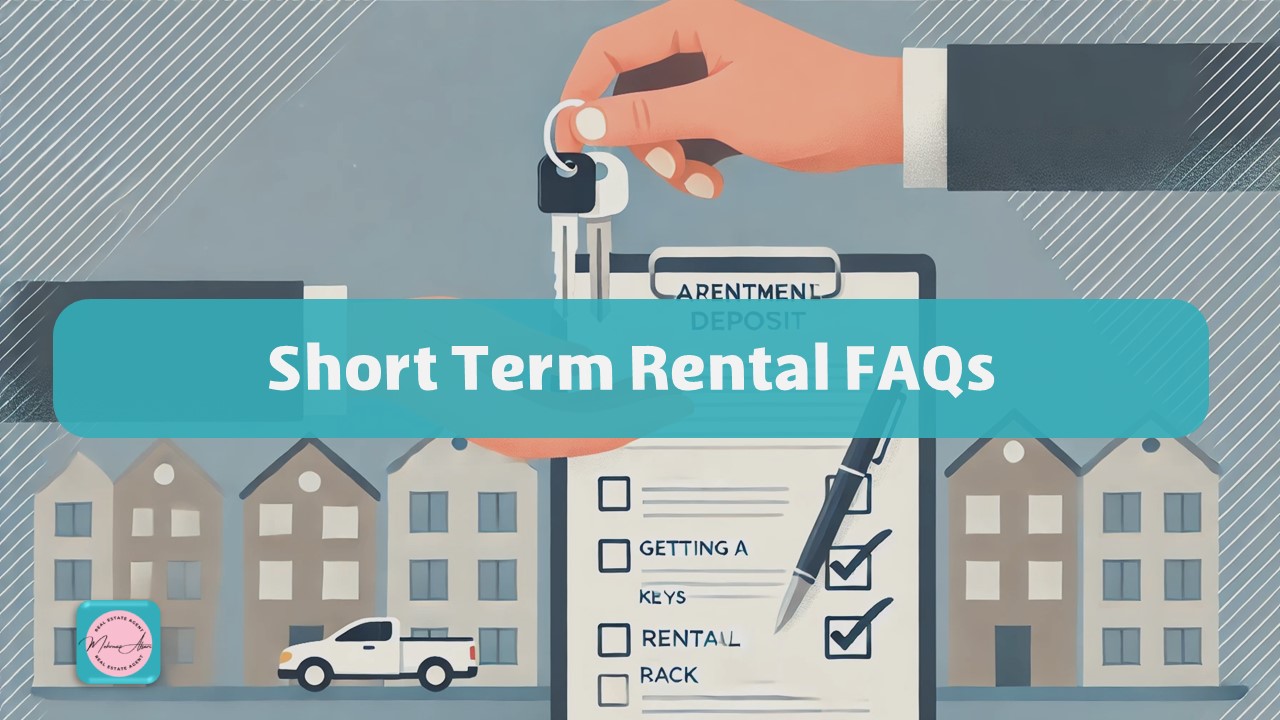Short-term rentals have transformed the way people travel and earn income. Whether you’re a homeowner thinking about listing your space on Airbnb or a traveler looking for an alternative to hotels, understanding how short-term rentals work is essential.
This guide of agent mehrnaz afsaris blog, real estate agent at las vegas, answers the most common questions — from permits and pricing to guest experience and legal protections. If you’re considering stepping into the world of short-term rentals, this is the expert-backed FAQ resource you need to make smart, informed decisions.
What Is a Short-Term Rental?
A short-term rental (STR) refers to leasing out a furnished property — a room, apartment, or entire home — for brief periods, typically ranging from a single night to a few weeks. These rentals have gained massive popularity as flexible alternatives to hotels, offering both hosts and guests unique benefits.
Short-term rentals are not just about vacations anymore. They’re used by business travelers, digital nomads, families relocating, and even locals looking for temporary housing during renovations or emergencies.
Let’s break down the concept, platforms, and user motivations behind STRs.
Definition and Typical Duration
A short-term rental is typically defined as a residential property rented for less than 30 consecutive days. Depending on local regulations, the cutoff may vary (some cities define it as under 28 or under 60 days).
This category includes:
-
Vacation homes rented for weekends
-
Apartments leased out weekly to remote workers
-
Spare rooms offered nightly to tourists
In contrast, long-term rentals involve leases lasting 6 months to a year or more, come with tenant-landlord agreements, and offer less flexibility in terms of guest turnover.
Common Platforms for Short-Term Rentals
Several platforms dominate the short-term rental industry, each catering to different types of guests and properties. The most popular ones include:
-
Airbnb – the most widely used platform, ideal for everything from single rooms to luxury homes
-
VRBO (Vacation Rentals by Owner) – focused on whole-home rentals, often used by families or groups
-
Booking.com – started with hotels but now includes short-term apartment listings
-
Tripadvisor Rentals, Plum Guide, and Furnished Finder – niche platforms with specific use cases or standards
These platforms provide built-in tools for booking, communication, payment, and even pricing optimization.
READE MORE: Is Buying a House in Las Vegas a Good Investment?
Are Short-Term Rentals Legal in My Area?
Before listing your property or even planning to book one, it’s critical to understand the legal status of short-term rentals in your area. Across the U.S. and beyond, regulations vary widely — from complete bans to supportive policies that encourage hosting with the right permits. What’s legal in one neighborhood might be completely prohibited just a few blocks away.
Cities and counties approach short-term rentals based on their local housing markets, tourism impact, and community feedback. That’s why hosts must do their homework before getting started.
City and County Regulations
Each city and county sets its own rules regarding short-term rentals. In some jurisdictions, the practice is fully legal with minimal restrictions. In others, there may be tight controls on the number of nights you can rent, whether you must be on-site as a host, or if rentals are limited to certain zones. For instance, some cities require hosts to live in the property for a majority of the year, while others cap the number of days a property can be rented annually. Failure to comply with these regulations can result in heavy fines or forced removal from rental platforms.
Zoning Restrictions
Zoning laws play a huge role in determining where short-term rentals are allowed. Residential zones may have different rules than commercial or mixed-use areas. Some neighborhoods may be designated “no-rental” zones, while others permit short-term rentals under specific conditions, such as proximity to tourist corridors or business districts. It’s essential to consult local zoning maps or city planning departments to confirm whether your property qualifies. Don’t assume that because your neighbor hosts an Airbnb, you can too — zoning enforcement can be selective and complaint-driven.
Licensing and Registration Requirements
In many cities, hosting legally means obtaining the correct licenses, permits, or registration numbers. This process may include applying for a business license, passing a property inspection, paying local occupancy taxes, and renewing permits annually. Some municipalities have streamlined this with online portals, while others require in-person applications and compliance checks. Additionally, platforms like Airbnb often ask hosts to provide license or permit numbers during listing creation, especially in regulated cities. Staying on top of licensing not only keeps your rental legal, but it also protects you from enforcement actions and builds trust with guests.
What Are the Pros and Cons of Hosting a Short-Term Rental?
Hosting a short-term rental can be financially rewarding, but it’s not without trade-offs. While many property owners are drawn in by the promise of high returns, the reality of daily operations, guest management, and risk exposure can be more complex than it seems. A well-informed host should understand both sides of the equation before jumping in.
Income Potential
The main appeal of short-term rentals is the possibility of earning significantly more than with long-term tenants. Especially in high-demand cities or tourist-heavy neighborhoods, nightly rates often exceed what you’d make monthly with a standard lease. Peak seasons, holidays, and local events can drive rates even higher, creating real momentum for building passive income. With smart pricing and good occupancy, many hosts cover mortgage payments — and then some.
Operational Challenges
On the flip side, managing a short-term rental can feel like running a mini-hotel. Turnovers happen frequently, which means cleaning, restocking, and guest communication are ongoing responsibilities. Handling bookings, answering questions at odd hours, managing calendars across platforms, and resolving last-minute issues can be time-consuming — especially for those without a property manager. Hosting is far from “set it and forget it” unless you automate heavily or hire help.
Guest Behavior and Property Damage Risks
While many guests are respectful, occasional issues with noise, damage, or complaints are unavoidable. The more guests cycle through, the higher the risk of wear and tear — or in some cases, outright damage. Even with screening, accidents happen. Some hosts experience neighbors’ complaints, HOA conflicts, or unexpected legal issues. That’s why strong house rules, deposits, and insurance are essential for minimizing downside.
What Should I Know About Taxes and Insurance?
Understanding the financial side of hosting is just as important as guest satisfaction. Taxes and insurance policies affect your bottom line — and not managing them properly could expose you to costly consequences. Fortunately, with the right knowledge and preparation, you can stay compliant and well-protected.
Reporting Short-Term Rental Income
In most cases, any income you earn from a short-term rental must be reported as taxable income. The IRS treats this revenue like any other business earnings, and platforms like Airbnb and VRBO often issue Form 1099-K if your earnings meet the reporting threshold. Even if you don’t receive a form, you’re still responsible for reporting. Some cities and states also require hosts to collect and remit occupancy or lodging taxes, similar to hotels, which may be automatically handled by the platform or need to be paid manually.
Deductible Expenses
The good news is that many hosting-related expenses are tax-deductible. These may include cleaning fees, repairs, maintenance, utilities, supplies, advertising, property management, and even depreciation on the property itself. Keeping accurate records and separating personal from business use is critical — especially if you live in the property part-time. A tax advisor who understands real estate investments can help you maximize deductions and avoid audit triggers.
Insurance Policies and Coverage
Standard homeowner’s insurance often doesn’t fully cover short-term rental activity. That’s why it’s vital to have either a specialized short-term rental insurance policy or a business rider that explicitly includes guest stays. These policies typically cover guest injuries, property damage, and liability issues. Some platforms offer limited coverage (like Airbnb’s AirCover), but hosts shouldn’t rely on those as their only protection. Talk to your insurance provider to ensure your coverage matches your rental strategy — and be sure your policy is up to date before welcoming guests.
What Makes a Property Ideal for Short-Term Rentals?
Not every property is suited for short-term rental success. While location is often the headline factor, the full picture includes design, comfort, functionality, and guest perception. A well-performing rental doesn’t just exist — it’s built intentionally with guest experience in mind.
Location and Accessibility
Properties near tourist attractions, business districts, hospitals, or transit hubs tend to perform better. Guests want to be close to where they’re going — whether it’s a conference, a concert, or the beach. Even in suburban settings, being near a freeway entrance, public transportation, or a local hotspot can add major value. Walkability, parking options, and safety perceptions also influence booking decisions and guest satisfaction.
Furnishing and Amenities
The most successful listings often go beyond the basics. Comfortable beds, thoughtful decor, fully stocked kitchens, fast Wi-Fi, and workspace options all contribute to great guest reviews. It’s not about being the most luxurious — it’s about being complete, clean, and consistent. Guests remember the little things: blackout curtains, phone chargers, a coffee setup, or even labeled light switches. The goal is to remove friction and create a space that feels easy to live in.
Cleanliness, Safety, and Curb Appeal
A spotless, well-maintained space isn’t a bonus — it’s a requirement. First impressions matter, and guests will evaluate your property the second they arrive. Secure entry systems, clear instructions, and visible safety features (like fire extinguishers or first aid kits) go a long way in building trust. Curb appeal is equally important. Whether it’s a tidy front porch or a freshly mowed lawn, exterior presentation sets the tone before the guest ever steps inside.
How Do I Set Pricing and Manage Bookings Effectively?
One of the most underestimated aspects of successful short-term rental hosting is mastering the art of pricing and calendar management. Without a clear strategy, hosts risk leaving money on the table or suffering long stretches of vacancy. But with the right tools and insights, you can optimize both occupancy and income.
Dynamic Pricing Tools
Manually adjusting rates is time-consuming — and often inaccurate. Dynamic pricing tools like PriceLabs, Beyond, or Wheelhouse use real-time market data, competitor analysis, local events, and historical trends to automatically adjust your nightly rate for maximum profitability. These tools help prevent underpricing during high-demand periods and overpricing during slow seasons. Most of them integrate with platforms like Airbnb and VRBO, saving time and boosting efficiency.
Seasonal Trends
Understanding your market’s seasonal rhythm is crucial. Some areas thrive in summer, others in ski season, and some maintain year-round appeal. Identifying when demand peaks and dips allows you to plan for rate changes, maintenance breaks, and marketing pushes. Keep in mind that holidays, local festivals, or sporting events can create unexpected surges in demand — savvy hosts anticipate these and adjust accordingly.
Calendar Management Best Practices
An organized calendar is more than just blocking and unblocking dates. It includes syncing across platforms, setting minimum stays, managing booking windows, and planning turnover time. Avoid double bookings by using a channel manager or PMS (Property Management System) that centralizes your listings. Leave at least a few hours between check-out and check-in to ensure enough time for cleaning and inspections. And consider setting rules for last-minute bookings or early check-ins to streamline your workflow and reduce stress.
Short Term Rental FAQs
Do I need a license to operate a short-term rental?
in many cities you are required to obtain a business license, permit, or registration number to legally operate a short-term rental. Local laws vary widely, so it’s essential to check with your city or county for the specific requirements — especially before listing your property on platforms like Airbnb or VRBO.
How much money can I make from Airbnb or similar platforms?
Earnings depend on location, property type, seasonality, and how well you manage your listing. Some hosts make a few hundred dollars a month, while others generate full-time income. With dynamic pricing and high occupancy, many properties in popular areas earn thousands monthly, especially during peak travel seasons.
What insurance do I need for short-term rentals?
Standard homeowner’s insurance usually doesn’t cover short-term rental activity. You’ll need a specialized short-term rental policy or a business rider that includes liability, property damage, and guest injury. Some platforms offer limited protection (like Airbnb’s AirCover), but it’s best to have your own dedicated coverage.
Can I live in my house and still rent part of it short-term?
many hosts rent out a spare room, basement suite, or guest house while living in the main part of the home. This setup is often referred to as “home sharing” and may be subject to different local regulations or tax rules compared to whole-home rentals.
What happens if a guest damages my property?
If damage occurs, most platforms offer resolution centers or host guarantees to assist with claims. You should always document the property before and after each stay and communicate any incidents promptly. Having your own insurance in place is the safest way to ensure you’re covered for larger or excluded damages.
Conclusion
Short-term rentals offer an exciting way to generate income, meet new people, and make use of your property in dynamic, profitable ways. But success doesn’t come from listing a space and hoping for the best — it requires informed planning, legal compliance, smart pricing, and delivering exceptional guest experiences.
Whether you’re just exploring the idea or already hosting, understanding the rules, financials, and best practices can make a major difference. Take the time to evaluate your location, your property’s strengths, and your personal capacity for managing bookings and guests.





